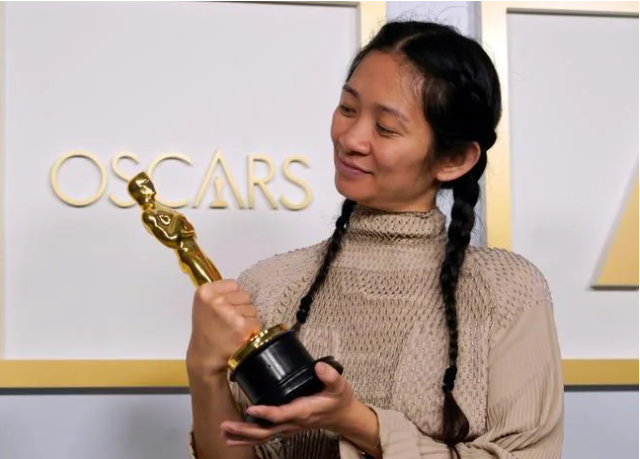This article is more than
3 year oldHistoric wins for Nomadland – and surprise victory for Anthony Hopkins – at odd Oscars

During an unusual Oscars ceremony, on-the-road drama Nomadland triumphed with a win for best picture, best actress and a historic victory for Chloé Zhao, becoming the first woman of colour to be named best director and only the second woman ever.
The film, starring Frances McDormand as a woman living out of her van and interacting with real-life nomads, took home the top trophy near the end of a delayed night and a delayed season amid the pandemic. The ceremony played out in person but with safety precautions and a modest guest list.
“Please watch our movie on the largest screen possible and one day soon take everyone you know, shoulder-to-shoulder, in that dark space and watch every film that’s represented here tonight,” McDormand, who also acts as producer on the film, said in her speech, winning two Oscars for picture and actress.
Zhao became only the second woman ever, after Kathryn Bigelow, to be named best director. In her speech, she called making the film a “crazy once-in-a-lifetime journey” and spoke of a childhood game with her father that introduced her to the idea that “people at birth are inherently good”, something that has stuck with her since. “Even though sometimes it might seem like the opposite is true, I have always found goodness in the people I have met,” she said.
While many had expected Chadwick Boseman to posthumously win best actor for his performance in Ma Rainey’s Black Bottom, Anthony Hopkins caused an upset by winning for his role in The Father, a drama about dementia. He wasn’t available to give a speech. Christopher Hampton and Florian Zeller also won best adapted screenplay for the film.
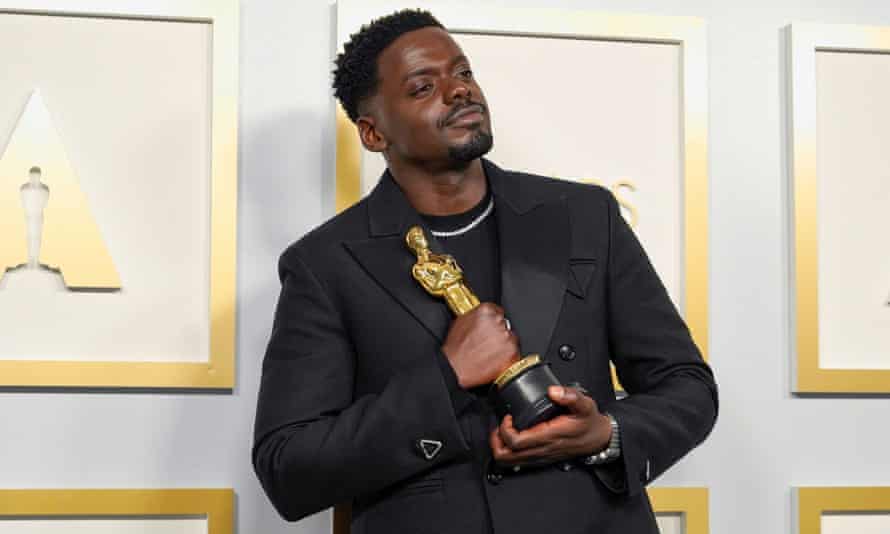
Daniel Kaluuya picked up the award for best supporting actor for his role as the Black Panther Fred Hampton in Judas and the Black Messiah, beating out his co-star LaKeith Stanfield, who was also nominated. Speaking of Hampton, he said: “What a man – how blessed we are that we lived in a lifetime where he existed.” He said the Black Panthers “showed us the power of union and power of unity” but added: “There’s so much work to do, guys, and that’s on everyone in this room.” The film also won best original song for Fight For You from HER.
Youn Yuh-jung became the first Korean actor to win an Oscar, picking up the best supporting actress award for her role in the family drama Minari. “I don’t believe in competition,” she said. “How can I win over Glenn Close … Tonight, I’m here because I’m luckier than you. I think maybe it’s American hospitality for a Korean actor.”
Emerald Fennell picked up the Oscar for best original screenplay for the darkly comic revenge thriller Promising Young Woman, making her the first woman since 2007 to win the award. “I want to thank Carey Mulligan not only for being the most talented person in the world but the kindest and the funniest,” she said in her speech, paying tribute to her nominated star.
Soul won for score and best animated film while the Oscar for international feature went to Denmark’s Another Round, whose director, Thomas Vinterberg, was also nominated for best director. He paid tribute to his daughter, who died during production in a car accident. “We ended up making this movie for her as a monument,” he said.
The Guardian also won its first Oscar, for best documentary short, with Colette, about a French resistance fighter. “This award is a tribute to women of any ages who are joining hands and fighting for justice,” the producer Alice Doyard said.
Netflix’s My Octopus Teacher was named best documentary feature.
Ma Rainey’s Black Bottom won for costume design and best makeup and hairstyling, with Mia Neal and Jamika Wilson the first black winners of the award. “I know that one day it won’t be unusual or groundbreaking, it will just be normal” for black women, trans women, and Latinas to be claiming Oscars, Neal said.
David Fincher’s Mank entered the night with 10 nominations, the most of any film, and left with two wins for production design and cinematography. The Riz Ahmed-led drama Sound of Metal won for sound and editing. Netflix won seven awards during the night, the most of any studio or streamer.
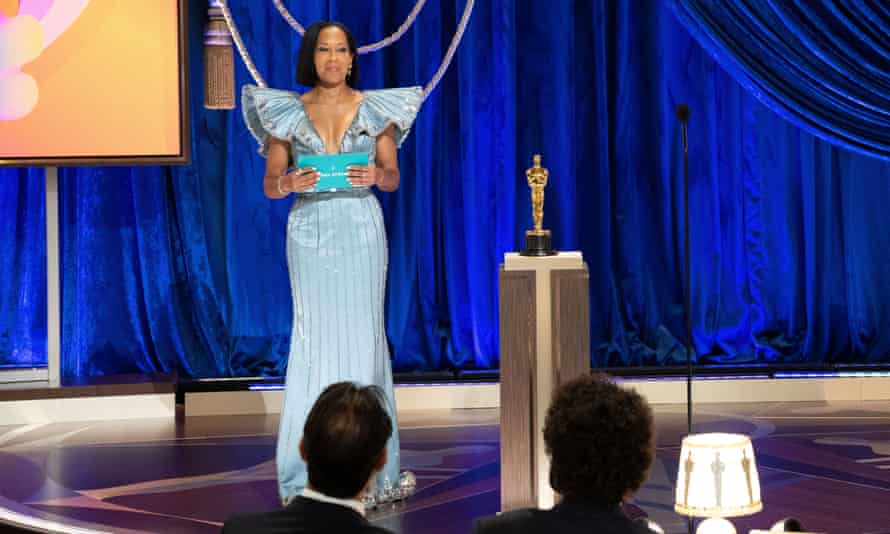
After a year of mostly virtual or at least semi-virtual awards ceremonies, the Academy moved from the Dolby Theatre to Union Station in Los Angeles with different locations in other cities including London, Sydney, Berlin and Paris to bring together a streamlined number of guests in person: just nominees, their guests and presenters. For the third year running, the night was host-less but commandeered by a number of big names, from Halle Berry to Harrison Ford to Reese Witherspoon to last year’s winners such as Brad Pitt and Renee Zellweger.
The night was co-produced by Steven Soderbergh and while he eschewed some of the standards (best songs were pre-filmed and kept to the pre-show while no single speech was played off with music), he added a number of stylistic flourishes including the Oscar winner Regina King, director of one of the night’s nominated films One Night in Miami, strutting into the ceremony accompanied by a music, closer to the opening credits of a movie. She also compared it to a movie set with regards to safety procedures, strictly enforced to allow an in-person event.
King also used her time on stage to make reference to the verdict of the Derek Chauvin trial and the fraught US climate that sees people of colour still disproportionately at risk of police violence. “As a mother of a black son, I know the fear that so many live with and no amount of fame or fortune changes that,” she said. Her words were echoed by Travon Free, who co-directed police brutality drama Two Distant Strangers, which won best live-action short film. “I just ask that you please not be indifferent, don’t be indifferent to our pain,” he said. The animated short film co-winner Will McCormack also made a plea for systemic reform. “We deserve better, we must do better, we will do better,” he said. As he accepted the Jean Hersholdt humanitarian award, Tyler Perry also spoke of the importance of refusing hate. While introducing the in memoriam section, Angela Bassett also paid tribute to those who died this year as a result of injustice and racism.
The night’s one viral moment came late in the day from Glenn Close who twerked along to Experience Unlimited’s Da Butt, a rare moment of levity in a mostly business-first ceremony.
Last year’s ceremony, which included wins for Joaquin Phoenix and Renee Zellweger and saw Parasite become the first foreign language film to win best picture, was the least-watched of all time. This year’s awards arrive after ratings have plummeted for both the Golden Globes and the Grammys.
Keywords

04/12/2023
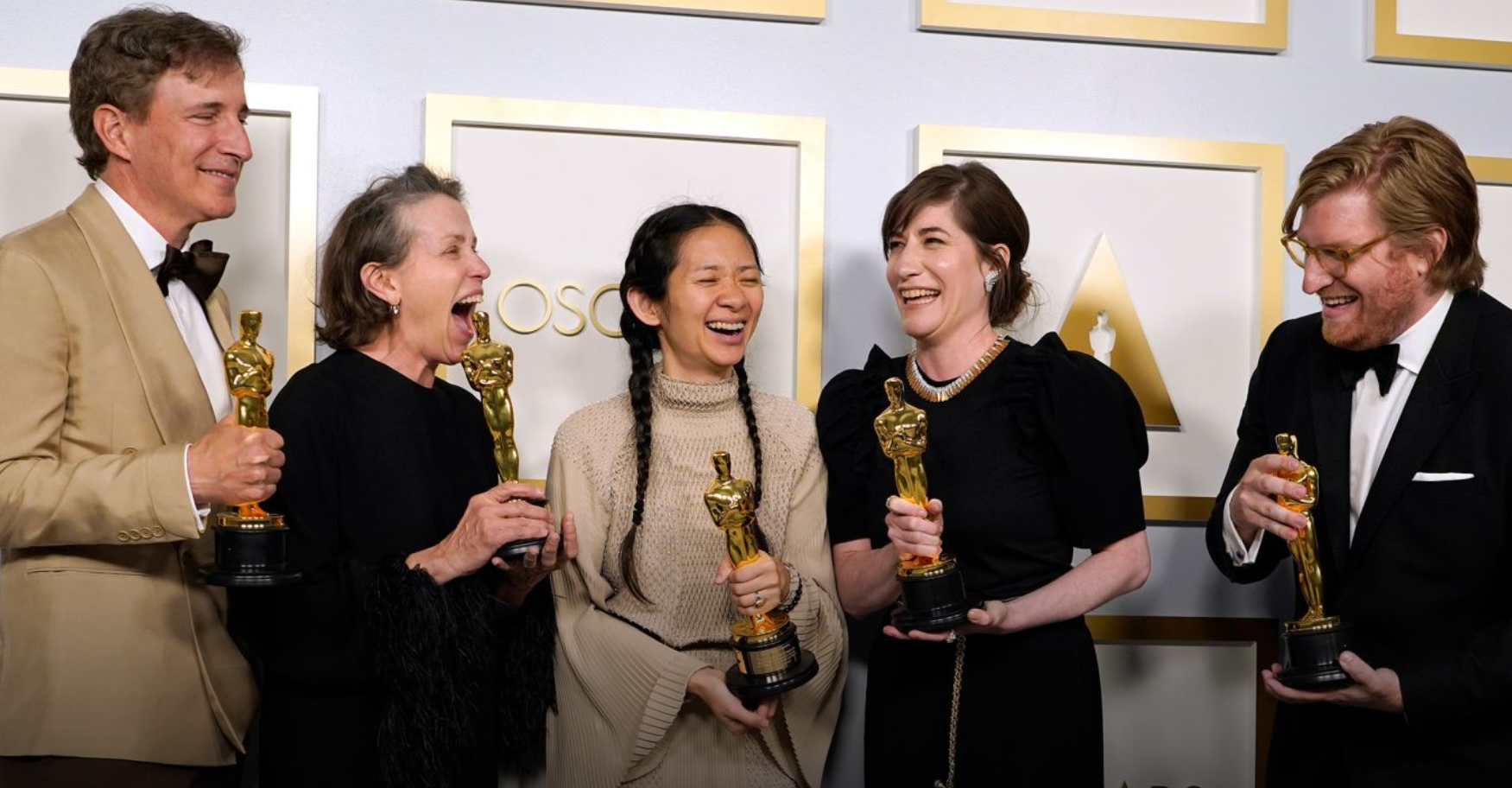
27/04/2021
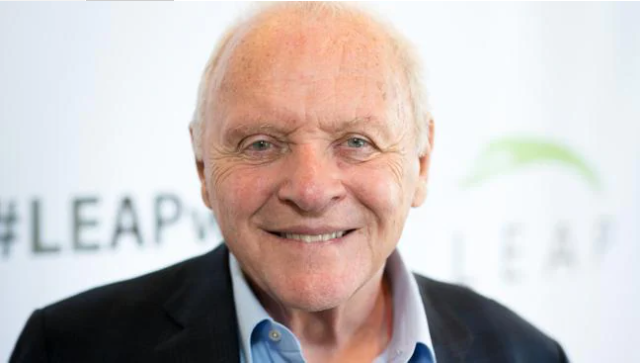
26/04/2021
Newer articles
<p>Diddy's homes were recently raided in Los Angeles and Miami by Homeland Security.</p>
India calls for ‘immediate de-escalation’ amid Israel-Iran tensions
Why Israel is risking a dramatic escalation with Iran
Israel’s War Leaders Don’t Trust One Another
Trump offers conditions for Ukraine aid renewal
Bianca Censori stuns in extreme v-neck dress
Iron Dome, David’s Sling, Arrow: Israel’s air defense against Iran, explained
OJ Simpson to be cremated and no plans to donate brain to science, lawyer says
US helped Israel take down ‘nearly all’ Iranian drones and missiles – Biden
‘Their tactics have changed’: Russia’s bid to blow apart Ukraine’s power grid
